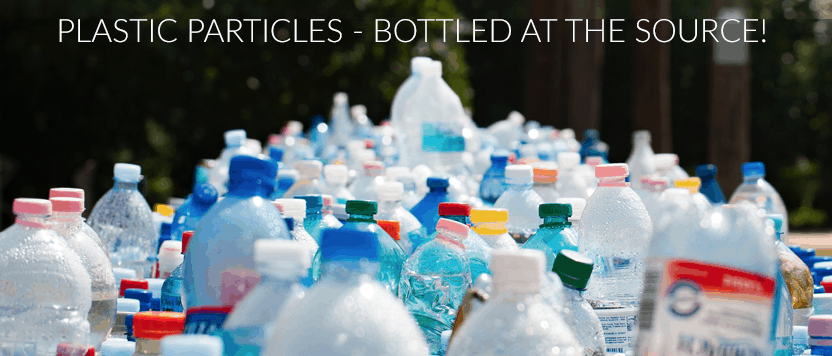You are what you eat; you are also what you breathe, drink, and touch.
If you are reading this in the United States, take heed: 3 in 4 Americans test positive for trace amounts of phthalates in their urine, and 9 of 10 have detectable levels of BPA (bisphenol A) in their blood. Both of these toxic compounds are not found in food- rather, they are found in plastic food containers! Even if you are already aware that heating your lunch in a soft plastic container can flood your food with toxins, there is more to know and more to do to reduce your exposure than to not microwave toxins. Read on to learn more about the latest findings related to BPA in our environment, the health effects of xenoestrogens like BPA and phthalates, and what you can do to avoid these chemicals in your daily life.
Like Dissolves Like
Think of plastic as a fat. Have you ever seen a plastic container (think Tupperware) after being used to store a meaty spaghetti sauce? It is permanently stained an orangy-red. But why? Because like dissolves like. The hot tomato sauce contains animal fat and lycopene, a fat-soluble reddish pigment found in tomatoes. A fat will dissolve in a fat: like dissolves like. Pour the sauce into the plastic container: a bit of tomato sauce becomes part of the plastic and a bit of plastic leaches into your tomato sauce. Yum.
The Truth about Water May Be Hard To Swallow
Many of us may actually be eating and drinking small pieces of plastic. In the largest investigation of its kind to date, a recent study of 250 water bottles purchased in 9 countries found an average of 10 plastic particles wider than a human hair per liter of water. Of these larger pieces of plastic, polypropylene was the most common polymer- found in common bottlecaps. The authors conclude that this “data suggests contamination is at least partially coming from the packaging and/or the bottling process itself.”
Plastics are Pervasive
There are several plastics with harmful health effects.
- Currently, humans produce about 6 billion pounds of BPA every year. One of the most researched xenoestrogens found in plastics, BPA is found in reusable drink containers (not just plastic water bottles), aluminum can lining, cash register receipts, toilet paper, DVDs, cell phones, eyeglass lenses, and automobile parts.
- Humans create over 18 billion pounds of phthalates every year. Found in far more than just plastics, phthalates have primary roles softening plastic and adhering artificial fragrances. Phthalates are found in food packaging, plastic wraps, pesticides, children’s toys, PVC piping, air fresheners, laundry products, personal care products, some medical supplies- and any product with “fragrance.”
Fat, Frustrated, Infertile, and Fragile
Compounds such as BPA, phthalates, and others such as parabens are xenoestrogens– foreign compounds that act like estrogens in your body. In women, excess estrogenic activity can lead to estrogen dominance and system-wide negative effects, including a higher risk of PMS, certain cancers, ovarian cysts, endometriosis, infertility, anxiety, and weight gain.
Men, listen up– these endocrine disruptors (hormone messer-uppers) can reduce the effects of testosterone in both sexes. A 2014 study published in the Journal of Clinical Endocrinology and Metabolism revealed that men, women, and children exposed to high levels of phthalates tended to have reduced levels of testosterone in their blood. Grown men need testosterone to support sexual health, muscle density, mood, and more- but keep in mind that women need testosterone as well. Many products men and women use to make themselves more attractive to one another- perfumes, creams, and the like- have endocrine-disrupting effects that can negatively affect your sex life. Consider that fat-soluble compounds are easily absorbed through skin. Your (and your partner’s) creams, moisturizers, deodorizing soaps, fabric softener, and other xenoestrogens (beyond plastic) also contribute to your xenoestrogen exposure.
In both men and women, xenoestrogens are functionally referred to as obesogens– compounds that cause weight gain. In women, estrogen causes weight gain (hence the weight gain with most oral contraceptives), which normally is voluptuous and supports child-bearing. When estrogen-like activity is excessive, you can become obese. Moreover, if your liver cannot process a toxin, especially fat-soluble toxins like these plastic-related compounds, you will store that toxin in fat. More fat → more toxin storage. More toxins, more fat made to store them. The more extra weight you have, the more likely you are to be carrying around a reservoir of damaging chemicals. Even minor sluggishness in your detoxification systems can cause your xenoestrogen exposure to build up over time.
While weight gain can drive inflammation, which may damage your arteries, there are other heart health risks from these compounds. New studies show a drastic rise in blood pressure after consuming foods in BPA-lined containers. Adding insulin to injury: a 2012 study in the journal PLoS ONE concluded that BPA triggers the release of almost double the insulin actually needed to break down food. Not only does chronically high insulin (along with high blood sugar) drive inflammation and damage arteries, it also leads to weight gain (insul-ate), insulin resistance, and increased risk of Type 2 Diabetes. Another recent study of American men correlated phthalate metabolite levels with core obesity and insulin resistance- two hallmarks of metabolic syndrome, which underlies many of today’s chronic diseases.
One benefit of estrogen is building and maintaining strong, healthy bone. One might think that xenoestrogens would support bone building by binding estrogen receptors. However, that is not the case. Estrogen disruption actually disrupts bone formation, leading to a greater risk of bone loss. In fact, research indicates that both BPA and phthalates negatively affect calcium absorption at the cellular level, so both the inputs and the process itself are disrupted. Add on a layer of toxin-driven obesity, notably correlated with low vitamin D, and you have a recipe for brittle bones.
Better Plastics?
Shifting to alternative plastics is currently a poor choice, though you may be optimistic for the future. The bad news first: many plastics thought to be strong alternatives to BPA such as BPAF, BPB, BPF, and BPS cause estrogen-like and anti-testosterone effects that are “similar to or even greater than that of BPA.” These compounds can kill cells, disturb reproduction, and cause brain damage. More research is clearly needed; keep this in mind when you grab a BPA-free item.
The good news? Promising research shows that some plastic analogs may have “low potential for affecting estrogenic or androgenic endocrine activity” and “suggest that the tested compounds could be suitable commercially viable alternatives to BPA.” That’s science-speak for we may have created a plastic you can use in the future that is safe for your sex hormones. But the good news at this moment is that next we will explain how to limit your damage today.
Plastic Police
While there are other xenoestrogen sources in your food, water, and household products, this blog is focusing on plastic. Given that there are likely other toxic compounds to avoid that we are not aware of and more will be created in the future, it is best at this time to avoid plastics altogether. Check out the following tips (also included in greater detail our book, Micronutrient Miracle) to help you reduce your exposure:
- Don’t microwave plastic food containers—ever!
- Look for the recycle codes on the bottoms of plastic containers. Some, but not all, plastics that are marked with recycle codes 3 or 7 may be made with BPA.
- Choose BPA-free canned foods. Some cans may be BPA-free, but glass is safest. Brands like Eden, Natural Value, Native Forest, and Muir Glen are BPA-free.
- Choose porcelain, glass, or stainless steel containers, especially for all-day-sipping. If you drink through a straw, both reduce your straw use and choose metal, paper or glass when you do.
- Ask your butcher to wrap your cuts in paper rather than PVC-lined paper wrap. Otherwise, the plastic will leach into the fatty tissue of your protein as it sits.
- Go paperless when checking out because your receipt is actually plastic, not paper. If you must touch receipts for work, wear nitrile gloves.
- When you freeze or otherwise store foods, choose safe alternatives such as glass storage containers with BPA-free lids; brands include Pyrex, MightyNest, and Martha Stewart.
- Choose glass containers when purchasing sprouted nut butters and other fats. Choose dark glass containers for oils to reduce light damage.
We take our role in helping you reduce your toxic exposure seriously. We offer our SKINNYFats (our fat-busting MCT/Organic coconut blended oils) in dark glass containers because we practice the powerful nutritional science that we preach! Sure, the cost is higher, but we feel that the cost of eating plastic is far greater. Help your hormonal health and stop eating plastic today.











